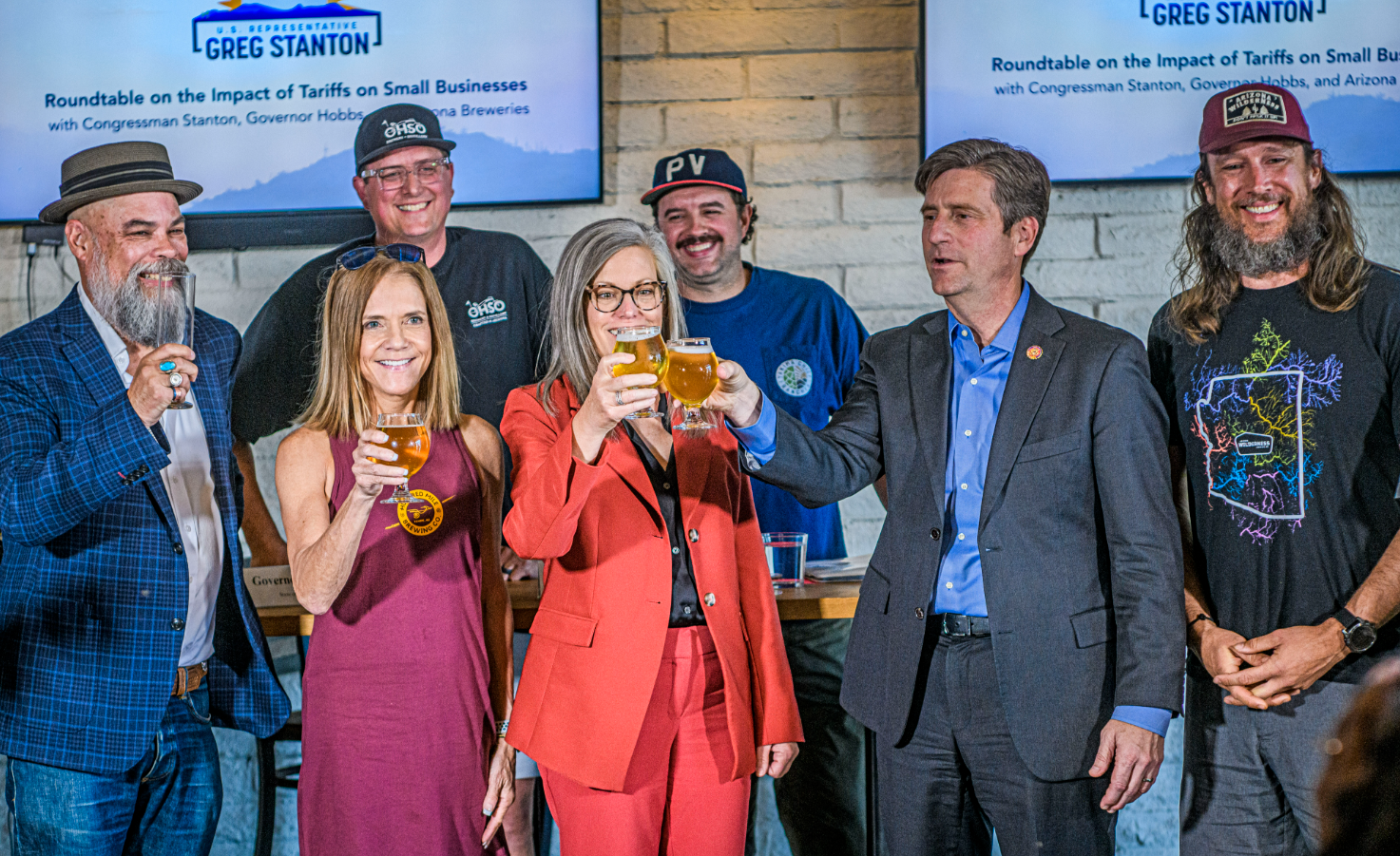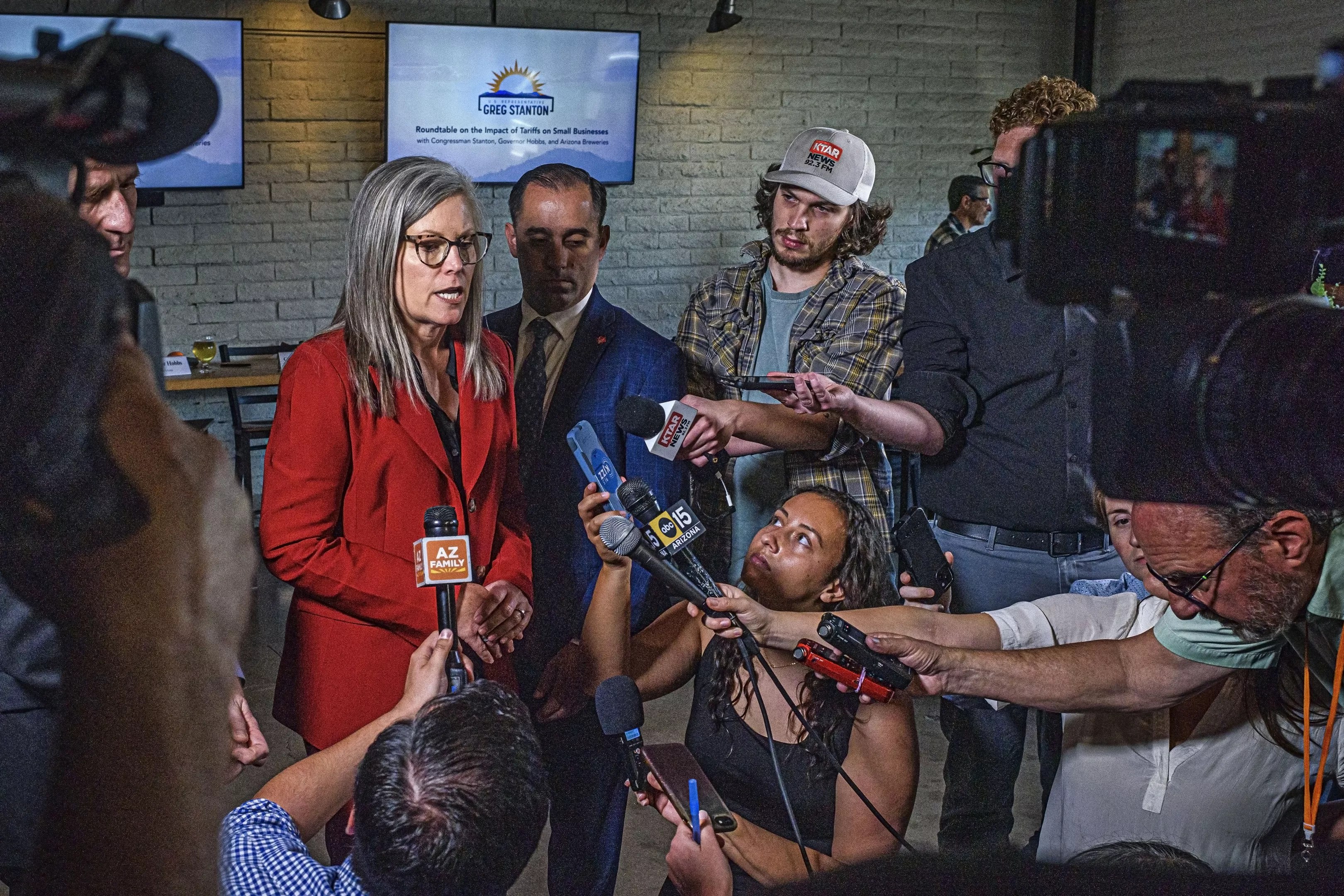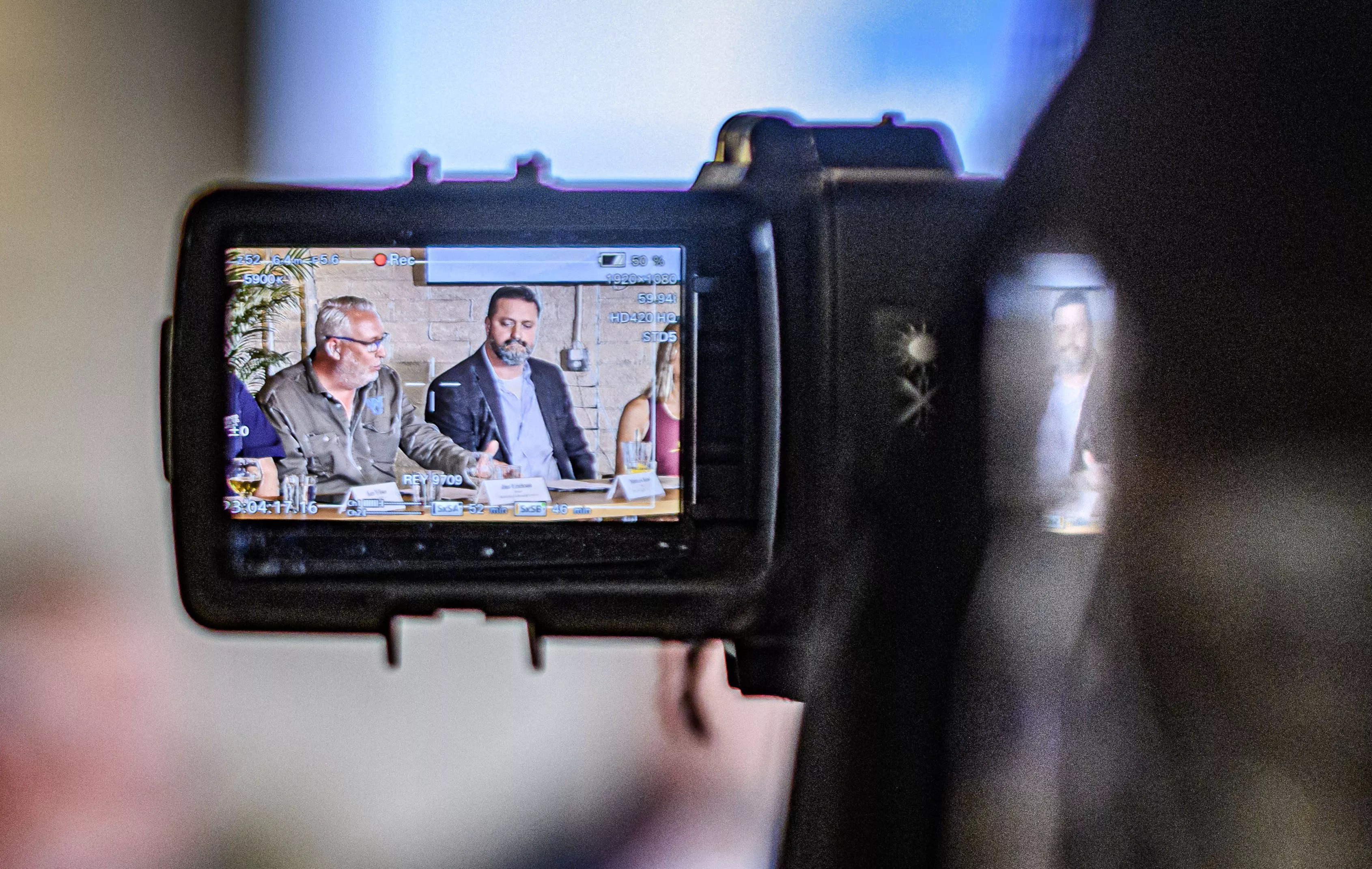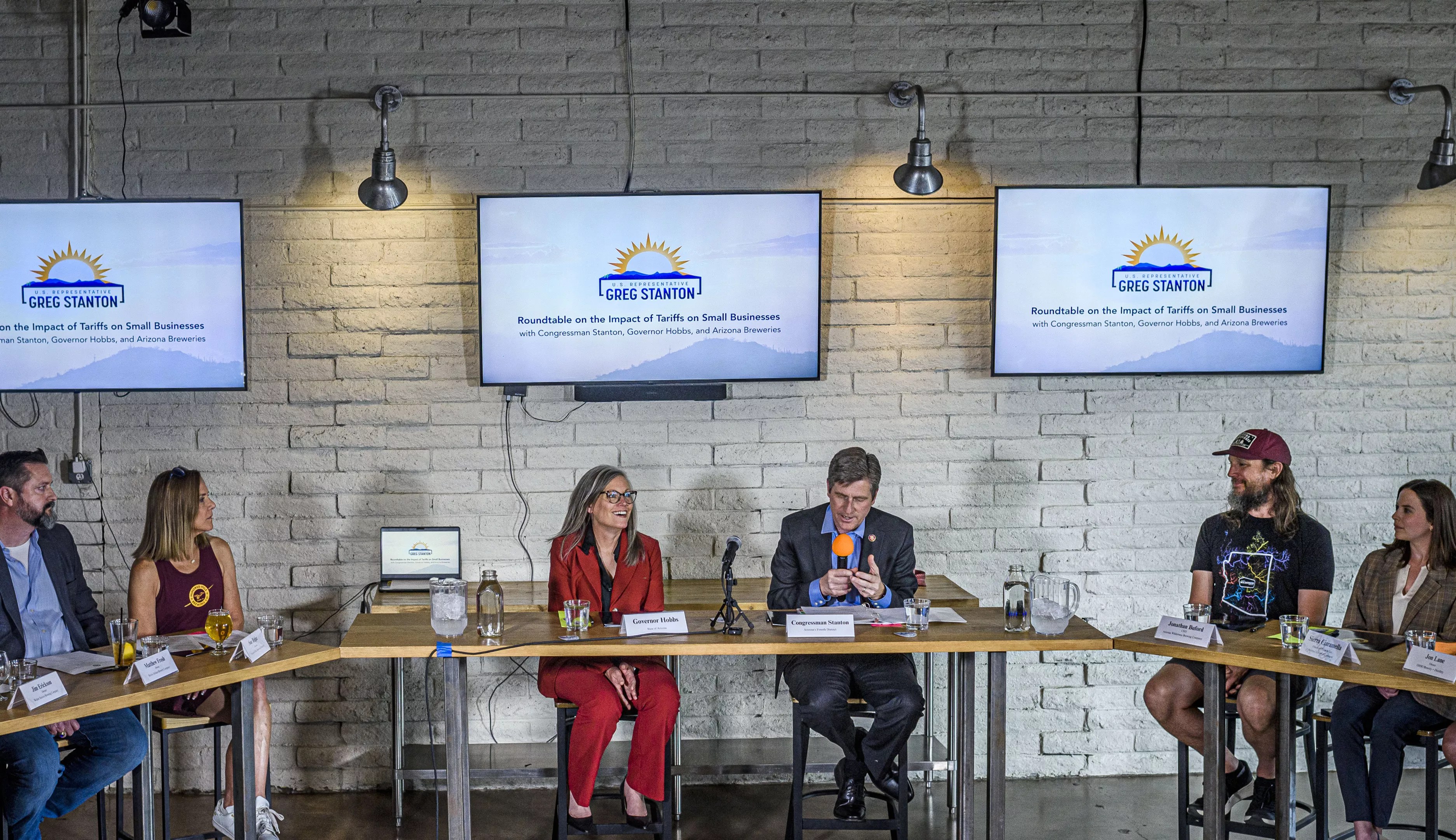
Kevin Hurley

Audio By Carbonatix
Eight Arizona craft brewery owners gathered around three high-top tables at Tempe’s Hundred Mile Brewing Co. on Tuesday to talk tariffs. They discussed how the U.S.’s rapidly evolving trade policy impacts their businesses, from the escalating price of aluminum cans to the challenges of planning amid economic uncertainty.
“I want to grow,” Hundred Mile owner Sue Rigler said. “(Tariffs weigh) heavily and we need stability.”
She and the other brewers were joined by Gov. Katie Hobbs, Rep. Greg Stanton, the Arizona Craft Brewers Guild and several business organizations.
“The whiplash on tariffs just puts American families and small businesses – and big businesses – in a really bad position,” said Stanton, who represents Tempe and Mesa in Congress.

Gov. Katie Hobbs addressed questions from reporters and local business owners at the Tempe roundtable event.
Kevin Hurley
What’s happening with aluminum, steel tariffs?
Craft breweries are just one of the many industries trying to navigate the trade war launched by President Donald Trump in his second term.
A tariff is a duty paid on items coming into the country. The importer pays the tariff, but the added cost can be passed along to buyers and consumers.
In other areas of the beverage industry, tequila distillers and winemakers are trying to make preparations for threatened tariffs.
Currently, tariffs are in effect on steel and aluminum, metals used in brewing equipment and packaging for beer. It’s not the first time in recent memory that tariffs have been imposed on these metals, but these latest tariffs are the most sweeping.
In his first term, Trump tagged a 25% tariff on steel and a 10% tariff on aluminum, but the president exempted Mexican and Canadian imports from those tariffs in mid-2019.
President Joe Biden relaxed tariffs on metals further, exempting the European Union in 2021. Then, this year, Trump raised the tariff on aluminum to 25% with no exemptions for any countries. This higher tariff went into effect on March 12.
The Aluminum Association estimates businesses in the U.S. source about two-thirds of the aluminum they use from Canada. While part of the aim of tariffs is to increase American manufacturing, “all U.S.-based smelters, even running at full capacity, cannot produce nearly enough metal to meet demand,” association president and CEO Charles Johnson said in a statement in February.

Arizona brewery owners discussed the impact of steel and aluminum tariffs on their businesses at the Tempe roundtable event.
Kevin Hurley
Local brewers brace as cans, other costs rise
These higher tariffs come during a tough time for breweries. Craft beer drinking is flagging and for the first time in nearly two decades, more breweries closed in the U.S. than opened in 2024.
The lack of tariffs in the 2010s is part of the reason O.H.S.O. Brewery + Distillery was able to expand, owner Jon Lane said at the roundtable event. Now, “it’s making me question whether to continue to grow,” he said, noting that the impact of tariffs may also be felt on other needs, such as employee uniforms and kitchen ingredients.
Walter Station Brewery‘s taproom and restaurant is set to close at the end of the month. The local business plans to shift its focus exclusively to producing and canning beers sold in grocery stores, convenience stores and bottle shops around the state.
Owner Jim Erickson said it took only “speculation” before he saw a higher cost on cans from his supplier. The first price hike – of about 20% – came before this latest round of tariffs was introduced, Erickson said. After the higher aluminum tariff was enacted, Erickson said, his can costs went up another 10%.
Right now, the brewery has to absorb those costs because Erickson sets a price on Walter Station six-packs with his partner stores, which stay locked for six months to a year.
“It really comes down to what can we absorb and for how long,” he said.
An owner of Arizona Wilderness Brewing Co., which opened a third Valley brewpub in Phoenix’s Miracle Mile this month, called for members of Congress to come to the table to find a solution.
“Good leadership is needed right now to stop what I call the insanity and go back to what’s working,” Jonathan Buford said. “I would ask for better leadership and less whiplash.”

Eight craft brewery owners shared their concerns with Gov. Katie Hobbs and Rep. Greg Stanton.
Kevin Hurley
‘Bipartisanship is the only way’
Hobbs and Stanton expressed a desire to understand brewers’ challenges so that they can share their stories and advocate for relief.
Lane asked Stanton how Congress can get to a solution.
The Democratic congressman didn’t have an immediate answer, but remained hopeful. He suggested that “private conversations” with colleagues across the aisle who have historically supported free trade hint that there’s potential for Congress to act on tariffs.
“We’ve seen some good signs,” Stanton said, pointing to four Senate Republicans who joined Democrats on a mostly symbolic resolution to block the proposed tariffs on Canadian imports.
“I think you’re going to see more and more of that as our Republican friends understand just how devastating it is for families and for small businesses,” Stanton said.
Hobbs said she’s been frustrated by congressional Republicans deferring to Trump and “abdicating their responsibility” on tariffs.
“I think that bipartisanship is the only way that we’re going to solve the tough challenges that we’re facing, whether it’s tariffs or whatever the issue is,” Hobbs said.
As the group gathered together, holding raised pint glasses for a photo, the panel concluded with no imminent solution in sight.